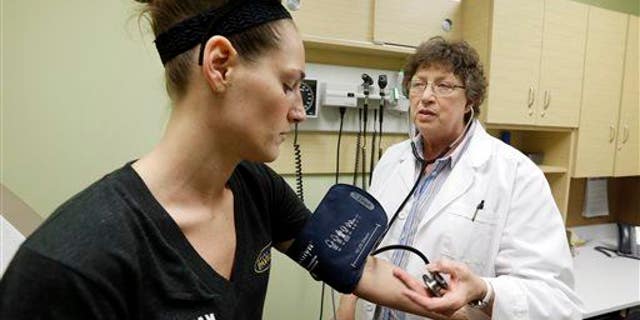NEWYou can now listen to Fox News articles!
YouTuber Kevin Samuels, who had over a million followers on Instagram, reportedly died of hypertension, otherwise known as high blood pressure.
He passed away on May 5; a copy of the autopsy report from the Fulton County Medical Examiner’s Office in Georgia was obtained by TMZ.
“The Office of the Fulton County Medical Examiner performed an autopsy on Mr. Kevin Samuels on Friday, May 6, 2022,” per the medical examiner’s press report.
It listed the cause and manner of death still as “pending” on its website.
But the medical examiner noted there was “evidence of hypertension … includes a heart whose chambers are thicker than normal,” as TMZ noted.
NEARLY 1 IN 5 US ADULTS WITH HYPERTENSION ARE TAKING MEDS THAT INCREASE BLOOD PRESSURE
Samuels was just 53 years old.
What is hypertension?
“Blood pressure is the pressure of blood pushing against the walls of your arteries. Arteries carry blood from your heart to other parts of your body,” as the Centers for Disease Control and Prevention (CDC) explains on its website.
“Blood pressure normally rises and falls throughout the day, but it can damage your heart and cause health problems if it stays high for a long time.”
Hypertension is a medical condition in which the blood pressure is higher than normal.

A woman has her blood pressure taken. Blood pressure is measured by two numbers, the systolic and diastolic.
(AP Photo/Darron Cummings)
The higher the blood pressure, the more the condition may affect the heart, brain, kidneys or eyes, causing life-threatening conditions such as a heart attack or stroke.
Blood pressure is measured by two numbers, per the CDC. The top number is known as the systolic blood pressure, which measures the blood pressure of the arteries when the heart contracts.
In 2020, there were approximately 670,000 deaths in the U.S. with hypertension as the primary or contributing cause, per the CDC.
The bottom number is known as the diastolic number, which measures the blood pressure of the arteries “when your heart rests between beats,” according to the CDC.
“If the measurement reads 120 systolic and 80 diastolic, you would say, 120 over 80,” or write, “120/80 mm Hg,” according to the health agency.
The blood pressure is measured in units called millimeters of mercury, also written as mm Hg.

A normal blood pressure reading is defined as less than 120/80 mm Hg, according to several expert sources.
(BSIP/Universal Images Group via Getty Images)
A normal blood pressure is defined as less than 120/80 mm Hg, according to the American College of Cardiology and the 2017 American Heart Association Guideline for the Prevention, Detection, Evaluation and Management of High Blood Pressure in Adults.
The same guidelines define an “elevated” blood pressure as a systolic blood pressure between 120–129 mm Hg and a diastolic less than 80 mm Hg.
High blood pressure, or stage 1 hypertension, is defined as systolic blood pressure of 130 mm Hg or diastolic 80 mm Hg — while stage 2 hypertension is defined as a systolic blood pressure of 140 mm Hg or greater or a diastolic blood pressure 90 mm Hg or greater.
Only some 24% of people with hypertension have their condition treated adequately, the CDC reports.
In 2020, there were approximately 670,000 deaths in the U.S. with hypertension as the primary or contributing cause, per the CDC.
“Nearly half of adults in the United States (47%, or 116 million) have hypertension, defined as a systolic blood pressure greater than 130 mmHg or a diastolic blood pressure greater than 80 mmHg or are taking medication for hypertension,” according to the CDC.
HEART ATTACK RISK CAN BE FOUND THROUGH NON-INVASIVE CALCIUM SCORE SCREENING SCAN
But only some 24% of people with hypertension have their condition treated adequately.
The agency said there are approximately 34 million more adults “who are recommended to take medication … [They] may need it to be prescribed and to start taking it.”

A nurse measures the blood pressure of a resident of a retirement home in her room.
(Tobias Hase/picture alliance via Getty Images)
Often, there are no warning signs of high blood pressure, so many people don’t realize they have the condition, according to the CDC.
“Measuring your blood pressure is the only way to know whether you have high blood pressure,” the agency said.
The condition develops over time, for various reasons, such as not getting enough physical exercise, or having an underlying medical condition, such as diabetes or obesity, that increases the risk.
HOW TO EXERCISE DURING A WORK TRIP AND STAY FIT WHILE TRAVELING
“But lifestyle plays a vital role in treating high blood pressure. Controlling blood pressure with a healthy lifestyle might prevent, delay or reduce the need for medication,” according to the Mayo Clinic.
“In addition to lifestyle changes, medications are often used to lower blood pressure.”
‘Treatment of high blood pressure often starts with lifestyle changes, including decreasing salt in your diet, losing weight if necessary, stopping smoking, cutting down on alcohol use, and regular exercise,” the U.S. Food and Drug Administration (FDA) added on its website.
CLICK HERE TO GET THE FOX NEWS APP
Treatment is often individualized and based on the stage of blood pressure, according to the American Heart Association.
“In addition to lifestyle changes, medications are often used to lower blood pressure. There are several types of medications that treat high blood pressure with each type of medication having benefits and risks that should be carefully weighed by you and your health care provider,” according to the FDA.



